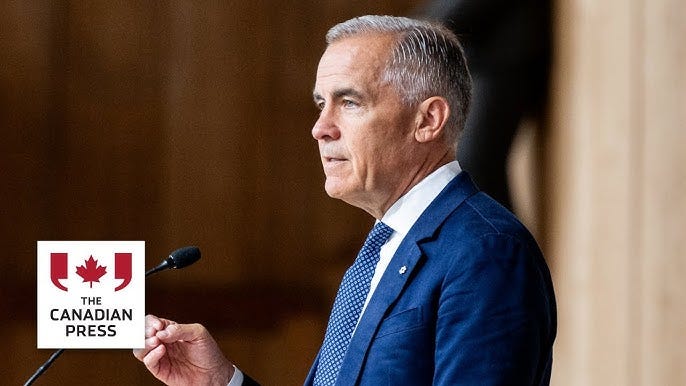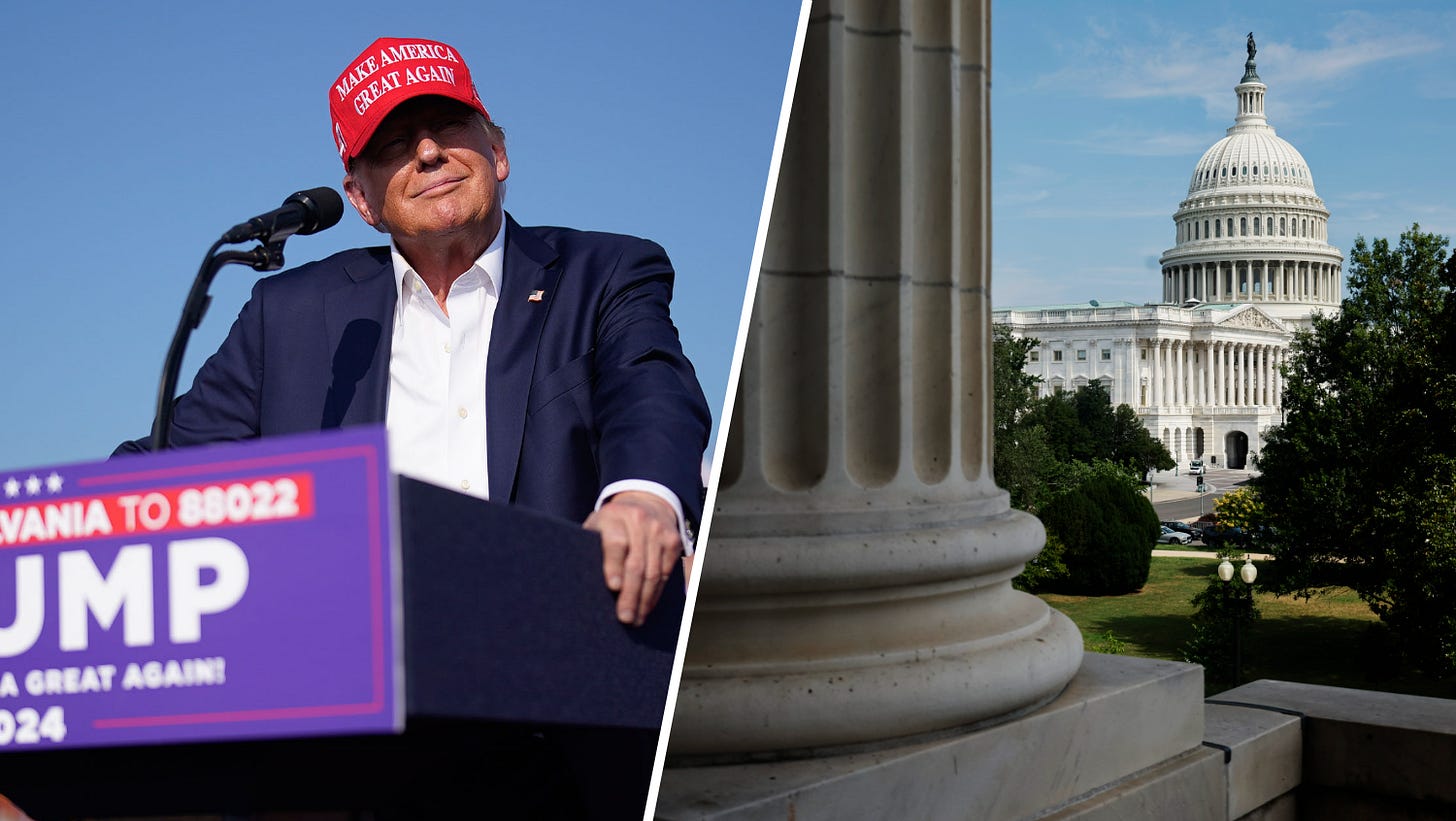Good morning, It’s Wednesday, August 6th. In today’s news, the Liberal government moves to strip religious charities of tax-exempt status, Carney signals repeal or overhaul of Online News Act, Trump and Musk call to federalize DC after a DOGE staffer was beaten, Emergency Rooms close overnight as Canada’s healthcare crisis deepens, and much more.
First time reading the daily blend? Sign up here.
Carney Government Moves to Strip Religious Charities of Tax-Exempt Status
In its latest report, the House of Commons Standing Committee on Finance—chaired under Prime Minister Mark Carney’s Liberal government—recommended a significant policy shift: removing “advancement of religion” as a recognized charitable purpose under the Income Tax Act.
Buried in Recommendation 430 of the Pre-Budget Consultations in Advance of the 2025 Budget, the Committee advised the government to amend the Act to “remove the privileged status of ‘advancement of religion’ as a charitable purpose.” If adopted, this change could strip thousands of religious organizations—churches, mosques, synagogues, temples, and faith-based service groups—of their charitable designation.
This proposal comes at a time when Canada is already facing a sharp decline in charitable giving. According to the Fraser Institute, national generosity has hit a 20-year low. The percentage of Canadians donating to charity has dropped from 22.4% in 2012 to 17.1% in 2022, while the share of income donated has also fallen. With fewer Canadians giving, the ability of the charitable sector to serve the vulnerable is already under serious strain.
Religious charities represent a major pillar of that sector. Of the 73,000 charities registered with the Canada Revenue Agency, over 30,000—roughly 42%—exist under the banner of “advancement of religion.” These aren’t just houses of worship; they include soup kitchens, homeless shelters, addiction recovery programs, palliative care services, and more. For many Canadians, especially the most vulnerable, religious institutions are often the first line of help.
That’s the lay of the land. And for many, it’s cause for concern.
One of the most prominent voices pushing back is Elbert King Paul, a former partner at a national accounting firm and a lifelong Liberal who has served under seven party leaders, including four prime ministers. Paul, also a practicing Christian involved in faith-based nonprofits, warns that this recommendation is a politicization of charitable status and a direct threat to the pluralistic foundations of Canadian civil society.
He argues that stripping religion from charitable recognition would not only ignore the massive contribution of faith-based groups, but also risk violating Charter rights, including freedom of conscience and religion. While this is a legally complex issue—tax exemptions are not guaranteed rights—Paul's warning raises a valid concern about whether religious viewpoints are being unfairly targeted.
In his view, the Finance Committee’s proposal undermines both Canadian generosity and constitutional principle—at a time when both are already on the decline. Source.
Carney Signals Repeal or Overhaul of Online News Act
Prime Minister Mark Carney says his government is open to rescinding or replacing the Online News Act (formerly Bill C-18) to ensure that Canadians have better access to local news—especially during emergencies.
The announcement comes two years after Meta banned Canadian news content in retaliation for the law, which required digital platforms to negotiate revenue-sharing agreements with Canadian news publishers for displaying or linking to their content.
While Google eventually signed a $100 million deal with Canadian publishers, Meta has stood firm, removing all news content from its Canadian platforms.
“We will look for all avenues to do that,” Carney said, referring to improving the reach and timeliness of local news.
Carney made the remarks during a press conference in West Kelowna, where he also acknowledged the toll of ongoing wildfires in the region, which have already triggered hundreds of evacuations. Carney emphasized the need for accurate and immediate access to local news coverage during crises, noting that the current digital news blackout on Meta platforms presents a real challenge to public safety.
Renewed Support for CBC
Carney also reaffirmed his support for CBC/Radio-Canada, promising to:
Boost its funding by $150 million annually, and
Reform its governance to ensure it can deliver unbiased, real-time local information in times of emergency.
This aligns with his broader messaging around public safety, information access, and media independence in a rapidly evolving digital environment. However, I seriously doubt CBC will ever deliver unbiased news—so long as it remains dependent on government funding.
A Turning Point in Media Policy?
Despite the renewed support and increased budget for CBC, Carney’s comments mark a significant shift in federal media strategy, suggesting his government may prioritize local news delivery over protracted battles with Big Tech. The Online News Act, once championed as a solution to the declining revenues of Canadian media, may soon be rewritten—or scrapped altogether.
Whether that change results in Meta restoring news content to Canadian users remains to be seen.
Trump and Musk Call to Federalize DC After DOGE Staffer Beaten
A violent assault in Washington, D.C. has sparked renewed calls for federal intervention, following reports that a staff member with the Department of Government Efficiency (DOGE) was badly beaten while intervening in an attempted assault.
The incident occurred Monday evening, when a group of young men allegedly attempted to assault a woman in her car at night. Edward Coristine, a DOGE staffer known by the nickname “Big Balls,” reportedly stepped in to defend her and was severely beaten—suffering a concussion in the process. Despite the injuries, he was able to stop the attack.
Shortly after the incident began circulating online, former President Donald Trump posted on Truth Social criticizing the state of crime in the nation’s capital. He described D.C. as “totally out of control” and warned that unless city officials take swift action, federal control of the District may be necessary. He also called for prosecuting violent offenders as adults, including minors involved in serious crimes.
“They are not afraid of Law Enforcement because they know nothing ever happens to them,” Trump wrote. “We will have no choice but to take Federal control of the City.”
In response, Elon Musk shared Trump’s post on X and confirmed that the man beaten was a member of DOGE. “It is time to federalize DC,” Musk wrote, echoing Trump’s warning and praising Coristine for his bravery in protecting the woman.
The attack comes at a time when violent crime in Washington has been under increasing scrutiny. Though the city has seen periods of decline in overall crime rates, recent spikes in carjackings, assaults, and incidents involving minors have reignited debates about public safety, law enforcement, and local governance.
Washington, D.C. is unique in that it operates as a federal district rather than a state. While it has had limited home rule since the 1970s, Congress ultimately retains the power to override local laws and enforce federal control.
Whether this incident will result in concrete political action remains to be seen. But the convergence of calls from both Trump and Musk suggests growing frustration among high-profile figures about the state of public safety in the capital—and a renewed debate over who should ultimately be responsible for it. Source.
Cybercrime Is Booming—And AI Just Became Its Secret Weapon
Cybercriminals have gone high-tech, and governments, hospitals, and businesses are paying the price. In 2024 alone, there were over 5,200 ransomware attacks worldwide—a 15% spike from the year before. The average cost of an attack has skyrocketed to $5.14 million, up from just $761,000 in 2019, and cybercrime—including cyberscams that are carried out using stolen data—costs $32 billion per day globally.
Artificial intelligence is making it faster and easier for attackers to find vulnerabilities in digital infrastructure. They're exploiting everything from outdated firewalls to sloppy password hygiene, and most organizations simply aren’t equipped to keep up.
Nearly half of targeted companies admit to paying ransoms, most of which flow through cryptocurrency, leaving little trace and fueling a booming underground economy.
Some countries are trying to fight back. The UK banned public-sector ransom payments in July 2025, and international law enforcement has made key arrests, including Scattered Spider’s Tyler Buchanan and the admin of the notorious XSS.is forum. But even with a few kingpins behind bars, the machine keeps running. More
Emergency Rooms Close Overnight as Canada’s Healthcare Crisis Deepens
For the second consecutive night, Delta Hospital’s emergency department will operate without doctors overnight due to staffing shortages, forcing nurses to provide limited care and redirect patients to nearby hospitals. This “temporary service interruption” highlights a growing crisis across BC’s healthcare system, following similar closures at Mission Memorial Hospital and South Okanagan General Hospital.
Fraser Health warns that while other emergency departments remain open, overcrowding and staff shortages are causing longer wait times and forcing difficult decisions to prioritize urgent cases. These repeated ER closures reflect years of government mismanagement, staffing shortages, and systemic neglect, leaving hospitals struggling to maintain basic emergency services and exposing the dangerous fragility of our publicly funded system. More
US House Committee Issues Subpoenas for Epstein Files and Depositions with the Clintons - More
Families of October 7 Victims Sue Meta for $1 Billion for Allowing Atrocity Footage on Facebook
China Limits Supply of Critical Minerals to US Defence Sector - More
ICE Looks to Hire 10,000 More Agents, Offers $50,000 Signing Bonuses, Student Loan Forgiveness - More
A Shipwreck Off Yemen Has Killed 56 Migrants and Left 132 Missing, UN Says in Revised Figures - More
China Cancels Passports and Bans Financial Support for Wanted Overseas Activists - More
Trump Accuses Major Banks of Political “Debanking” Amid Push for Executive Order
President Trump accused major US banks—like JPMorgan Chase and Bank of America—of “debanking” him for political reasons, saying they refused over $1 billion in deposits and closed long-standing accounts. He claimed this is part of a broader anti-conservative bias in the financial system.
His administration is now weighing an executive order to crack down on politically motivated account closures, building on existing GOP efforts to end the use of “reputational risk” in banking regulations. Trump’s organization is also suing Capital One for cutting ties after January 6th.
Banks deny political bias but support regulatory reform, with both JPMorgan and Bank of America backing the administration’s push for clarity. The issue has galvanized conservatives, who say financial institutions have long targeted right-leaning groups and industries. More
Carney Announces $1.2 Billion in Added Support for Softwood Lumber Industry in Response to US Tariffs - More
BP Makes Its Biggest Oil and Natural Gas Discovery in 25 Years as It Refocuses on Fossil Fuels - More
Canada’s Trade Deficit Widened to $5.9 Billion in June, the Second Highest on Record - More
NASA Chief: US Will Build a Nuclear Power Plant on the Moon
NASA’s acting chief Sean Duffy just revealed that the US is gearing up to build a nuclear reactor on the moon as part of the Artemis program’s bold push to not just visit but stay on the lunar surface. Why nuclear power? Because solar panels won’t cut it in some prime lunar spots where America wants to plant its flag—places rich with ice and sunlight that could support life long-term.
Artemis II will send four astronauts orbiting the moon, and Artemis III aims to land humans back on the lunar surface by mid-2027. After that, NASA plans unmanned missions to start constructing a permanent base powered by fission technology, a game-changer for sustaining life beyond Earth.
Duffy framed it as a high-stakes race against China, which is aiming for its own crewed lunar landing by 2030. With the Artemis program running behind schedule, the message is clear: America needs to speed up or risk losing its lead in the new space race. More
Evolutionary Origins of the Potato Revealed—A Tomato Was Involved - A new analysis of 450 genomes from cultivated potatoes and 56 genomes of wild potato species has revealed that the potato lineage originated through natural interbreeding between a wild tomato plant and a potato-like species in South America about 9 million years ago. More
‘The Greatest Games the World Has Ever Seen’: Trump Launches LA 2028 Summer Olympics Task Force
President Trump has signed an executive order creating a federal task force to prepare for the 2028 Los Angeles Olympics, promising a “fantastic, safe, and beautiful” event. Trump, who helped land the LA bid in 2017, called it a great honor to oversee what his team boldly claims will be “the greatest Games the world has ever seen.” Modesty, as always, optional.
The order also targets transgender athlete policies, directing a review to restrict transgender women from competing in women’s events at the Olympics, aligning with Trump’s February executive order. Federal agencies are tasked with reviewing and potentially rescinding funding for programs that violate these policies, aiming to protect fair athletic opportunities for women and girls. The US Olympic and Paralympic Committee pledged to work with international sports bodies to uphold these guidelines. More
Actress Kelley Mack from ‘9-1-1,’ ‘The Walking Dead,’ and ‘Chicago Med’,’ Dies at 33 - More
NFL Bans Smelling Salts, Saying the Product Can Mask Concussion Symptoms - More
Ovechkin Partners with a Russian Technology Company to Make a Movie About His Storied NHL Career - More
New Dutch Snack Brand Launches World's First 9-Volt Battery-Flavored Tortilla Chips—A Taste Many ‘80s and ‘90s Kids Won't Forget
Valedictorian’s Mom and Tutor Caught Breaking Into School to Steal Exam Papers in Bizarre Academic Heist
On This Day in 1661, the Treaty of The Hague was signed, whereby the Dutch Republic sold New Holland (Brazil) to Portugal for 63 tons of gold—if you're wondering how much this would be worth today, the answer is $4.66 billion USD.



















I’m curious as to whether Covid restrictions could have been imposed on churches as easily if they didn’t have charitable status. It seems the government has more leverage on religious groups because of charity status.